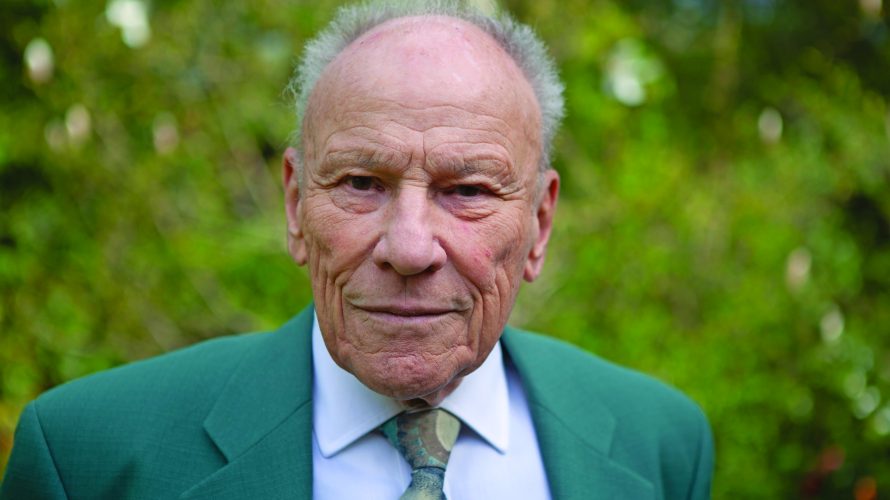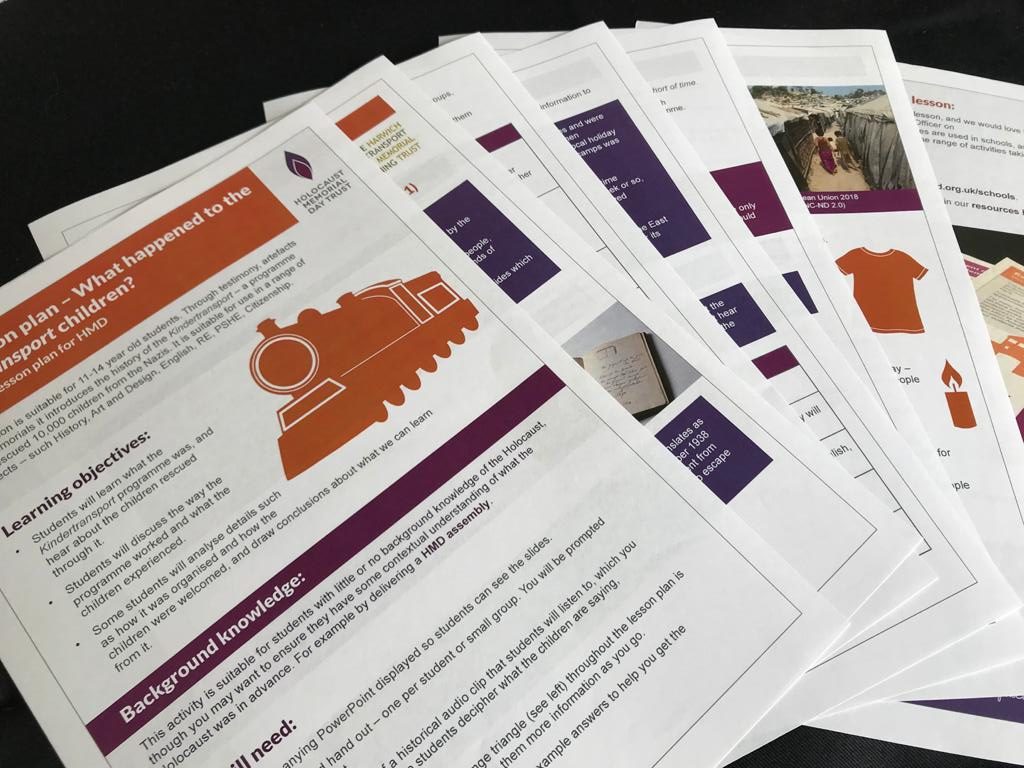
Tomi Komoly BEM
Tomi Komoly, born in Budapest in 1936, survived the Holocaust in hiding with his Mother. Post-war, he struggled under Communist rule, leading Tomi to escape to Austria in 1956. He completed his education, reunited with his mother, and was awarded a British Empire Medal in 2020 for his contributions to Holocaust education.
In no time at all, they sent around a couple of armed men who instructed my father to pack his bag and go with them. That was the last time I saw him. He was taken away just before my eighth birthday, and that was the end of our family.
Tomi Komoly was born in Budapest, Hungary in 1936, the only child of Alfréd and Margit. Before he was born, Tomi’s father and uncles changed their name from Kohn – a stereotypically Jewish name – to Komoly in an attempt to avoid prejudice. He describes his childhood as an average, suburban, secular Jewish life in Kispest, on the outskirts of Budapest. They rented a one-bedroom apartment in a two-storey villa.

Tomi as a young boy
In between the two world wars, Hungary was led by a series of right-wing governments and was allied to Nazi Germany. From 1938 onwards, the Hungarian government passed a series of anti-Jewish laws and economic restrictions. Tomi’s father, Alfréd, was forced to give up his business and they were left without an income. Alfréd took up ceramics, moulding decorative items out of clay and selling them.
In 1943, Alfréd was sent to the Russian front as part of a forced labour battalion, where he was made to do manual labour like digging trenches. This was a dangerous job: of the 45,000 forced labourers who were deployed to the Russian front, 33,366 were injured in some way. While his father was away, Tomi’s mother, Margit, baked cakes and biscuits at home to make some money to support them.
When the Hungarian government, upon witnessing German losses, tried to end their alliance with Germany in March 1944, German troops entered Hungary. Tomi was playing with his cousin Vera as they witnessed a column of German tanks rolling down a main road in the capital. After their arrival more anti-Jewish restrictions were imposed by ministers. Tomi remembers cutting out six pointed stars for his family when they were forced to wear the Star of David in public.
Following German instructions, the government made Tomi and his mother move into one of 2000 centrally nominated apartment buildings, known as ‘yellow star houses’, in Budapest. They could take very few belongings with them as they moved into a one-bedroom apartment with his mother’s cousin and her aunt. During regular air raids, they hid in the cellar, where they listened to the BBC on a secret radio.
In October 1944, a Hungarian extreme right-wing group known as the Arrow Cross seized power from the government in a German-supported coup. When Tomi’s father bribed his commander to give him a pass to return home for a few days, the building manager where Tomi and his mother were living noticed and reported him to the Arrow Cross. Alfréd was arrested several days before Tomi’s 8th birthday and he was never seen again.
After this, Margit asked Tomi’s uncle, Ottó Komoly, to use his leverage to get them a place in a ‘protected house’. These were buildings owned by foreign embassies where some Jews could hide and claim diplomatic protection. As President of the Hungarian Zionist Association, which was heavily involved in rescue operations in Hungary, Ottó had connections that could help. They moved into a small protected house, which they shared with 40 other people.

Tomi and his mother, Margit, in 1944
In the protected house, Margit continued to bake and deliver cakes to customers. One day, she was arrested by the Arrow Cross while making a delivery and marched off with a couple of hundred other women. Scared that she would be deported or killed, and her son abandoned to his fate, she ran away from the guards, who shot at her as she ran.
On Christmas Eve 1944, Tomi and his mother moved to hide in a family friend’s cellar in a Budapest suburb called Pesthidegkút. On their way, she bought a ‘teach yourself’ reading and counting book, so that Tomi could get some education while in hiding.
At the end of December 1944, the Russian army reached the outskirts of Budapest. They set up a large gun near to the house where Tomi and his mother were hiding. Tomi befriended the soldiers and they gave him the job of warning other residents of when they were going to fire, giving them time to protect their windows from the resulting change in air pressure.
Budapest surrendered to the Russian army on 13 February 1945. After staying in hiding for a couple more weeks, Tomi and his mother walked back to the city where they were reunited with
his grandmother. They moved into his grandmother’s apartment, where they lived for the next
11 years. To make money, Tomi’s mother initially sold pancakes on the streets and Tomi made and sold origami windmills, before she got an office job.
By 1949, following years of Soviet encroachment in Hungary, the Communist Party became the only legal political party. Having studied in a Jewish school after the war, Tomi faced new prejudice in a compulsory public school, because his family were considered ‘petty bourgeois’, rather than workers. To counteract this, Tomi joined the ‘Young Pioneers’, a Communist youth group.
Tomi won a part scholarship to the Technical University in Budapest to study mechanical engineering. However, after violent student protests in 1956, Tomi saw no future for himself in Hungary. He made two failed attempts to escape the country. The third time, he paid a local to guide him to the border and bribed two soldiers. He succeeded crossing the border into Austria and was found by a local farmer.
After staying in a refugee camp in Vienna for a few months, Tomi won a scholarship to study in the UK from the Ford Foundation and arrived in Dover on 17 March 1957.
In the UK, Tomi studied in Glasgow, before completing a Master’s degree in thermodynamics in Birmingham. He then started a PhD at Imperial College London, and he was recruited into a job with ICI (Imperial Chemical Industries). Every week he wrote back to his mother who was still in Budapest, until she was able to join him in the UK in 1964.
In October 1966, Tomi married his wife Gill. They have two children, Gabriella and Tanya, and live in Cheshire. In 2024, Tomi translated and published his uncle Ottó’s wartime diaries (Orphans of the Holocaust). He regularly speaks about his wartime experiences to audiences across the UK and was awarded a British Empire Medal in the Queen’s Birthday Honours List in 2020 for services to Holocaust Education and Awareness.
Top image credit: Sian Bonnell


